Rosemary Flowers: 26 Stunning Varieties To Grow In Your Garden
Charming the world with their exquisite beauty since forever - no wonder they are popular.
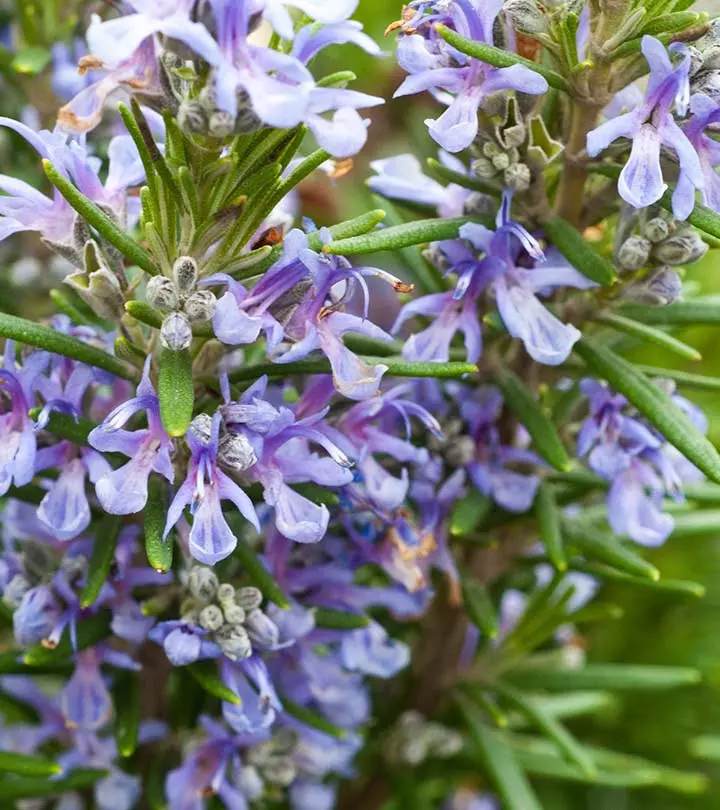
Image: Shutterstock
Rosmarinus officinalis, commonly known as rosemary, is an aromatic, hardy, evergreen shrub with intensely fragrant foliage. It is a member of the Lamiaceae family, also known as the mint family. The name Rosmarinus is derived from the Latin word ros, meaning ‘dew’ and marinus meaning ‘sea’ (dew sea) referring to the plant’s ability to thrive even without water. Officinalis indicates the medicinal use of the plant. It originated from the Southern European countries around the Mediterranean region. There are as many as 150 varieties of rosemary shrubs and creepers. It is considered as a symbol of friendship, loyalty and remembrance. This herbaceous plant is used variously as a medicine, food preservative, cooking ingredient and memory enhancer. In certain countries, students burn rosemary essential oil during exams to help them concentrate. Its flowers and leaves are used in ceremonies such as weddings, and in festivals for decorating banquet halls and warding off bad influences. Rosemary has a bitter, astringent taste which complements fatty foods such as meat and fish very well.

Here are the top 26 rosemary flowers by popular choice:
In This Article
1. Rosmarinus Officinalis Arp:
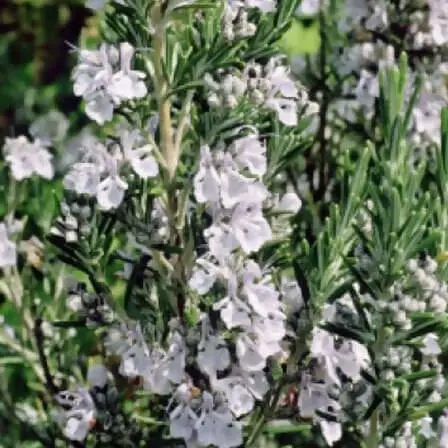
Arp is considered as the hardiest Rosemary flower. It was discovered by the late Madalene Hill in Arp, Texas. The gray-green clump has typical fine textured foliage with a wonderful fragrance. The shrub is dense, upright and highly aromatic. Its leaves are dark green in color. It has a leathery texture which sports small, edible blue flowers in whorls. The plant is quite easy to grow and does not require regular watering. Arp can tolerate a wide range of growing conditions but thrives best in light and well-drained soil.
 Trivia
TriviaKey Takeaways
- Rosemary flowers symbolize loyalty, remembrance and friendship.
- The origins of these flowers can be traced back to Southern European countries, around the Mediterranean region and they can thrive even without water.
- There are around 150 types of rosemary flowers and each has a unique color and foliage type.
- Along with being visually appealing, these flowers are also popularly utilized in culinary preparations, cultural ceremonies and traditional medicine.
2. Rosmarinus Officinalis Huntington Carpet:
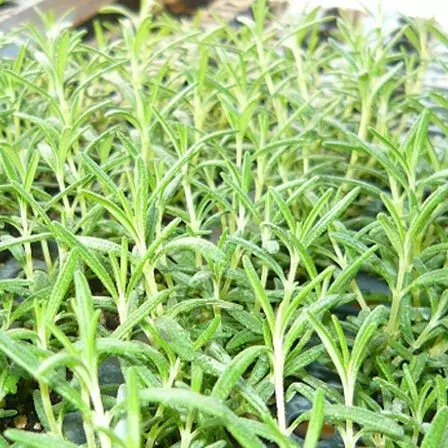
Huntington Carpet is a prostratus form of Rosemary that is greener and less woody than other rosemary varieties. The dense, ground hugging foliage and carpet of deep flowers create a dramatic waterfall kind of effect. Its leaves are also used as a flavorful culinary seasoning. The plant’s grayish-green leaves are potently fragrant even from afar. It bears small yet beautiful blue flowers from mid-spring to early summer. Huntington Carpet prospers best in locations with full sunlight and perfectly drained soil. It is deer, heat, and drought-resistant and attracts birds, butterflies, and bees.
3. Rosmarinus Officinalis Lockwood De Forest:
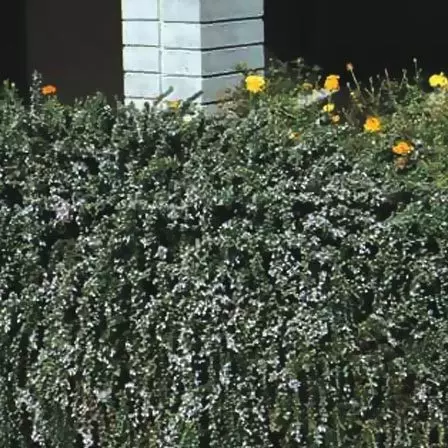
This rosemary was first discovered in 1930 in the Santa Barbara, California Garden of Elizabeth de Forest. It is native to the chaparral lands of southern Europe and North Africa. Small, two lipped lavender blue flowers appear along the heavy branches, densely clothed with rich dark green leaves. Lockwood de Forest is ideal for border planting and for placement along stone retaining walls. It thrives in well-drained soil in full sunlight.
4. Rosmarinus Officinalis Prostratus:
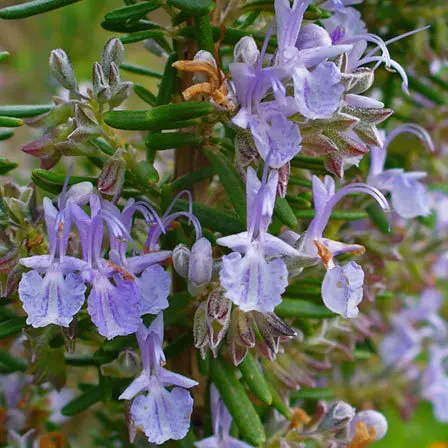
Prostratus is a hardy, fast growing, creeping variety of rosemary that is perfect for hanging baskets and patio plants. It has a strong minty scent and is attractive to butterflies. The shrub bears narrow, upright spikes of purple-blue flowers among leathery, aromatic, dark green leaves. These are followed by fruits which consist of a dry nut. Keep it trimmed for a more lush appearance. It performs best in nutrient-poor and shallow soils and tolerates both blazing sun and cold. The rosemary purple flowers are an useful, low growing variety that is less susceptible to wind damage than its taller plants.
5. Rosmarinus Officinalis Irene:
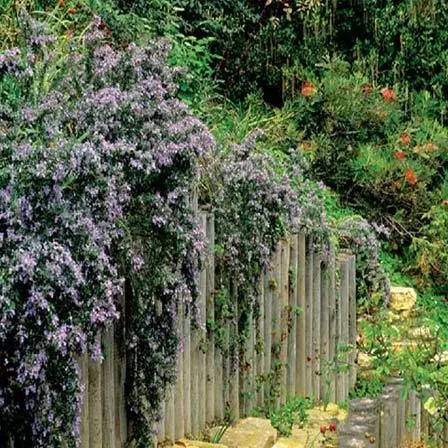
Rosmarinus officinalis Irene was discovered by Phil Johnson in early 1930s. It is a very popular variety of rosemary. The evergreen clumps of thin leaf are topped with small violet blue flowers which bloom every year in August. Its aromatic leaves have a hint of pine in both flavor and fragrance. It is perfect for rock wall planting or container planting where it can spill over the sides. This rosemary looks lovely in the garden.
6. Rosmarinus Officinalis Salem:
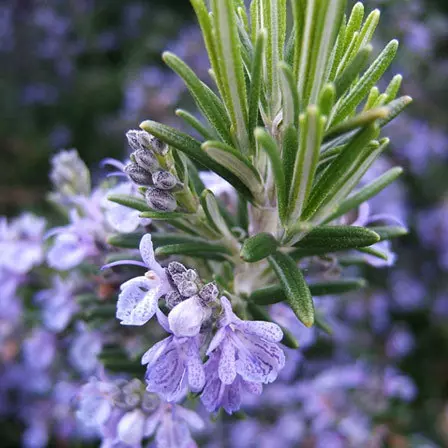
It is a fast growing, evergreen rosemary shrub which has an upright, rounded form. Salem has shiny, needle-like leaves which bear small, blue flowers in early spring. It is also called the “Christmas Herb”, and is well known for its strong pine-like fragrance. This rosemary can tolerate part shade but will get weak if it doesn’t get enough shade. Its fragrant branches can be used for dried flower arrangement or in cut flower bouquets. Salem can also be grown as a hedge in warmer climates.
7. Rosmarinus Officinalis Spice Islands:
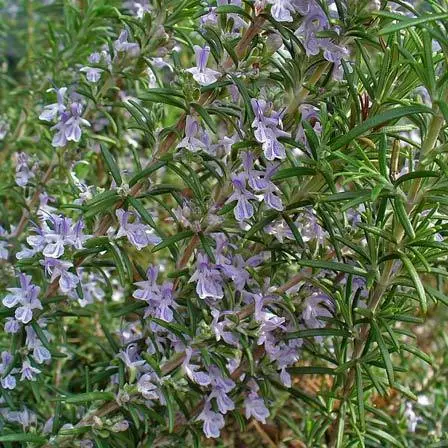
Spice Garden is a vigorous growing herb with sturdy and thick foliage. It is semi evergreen and is very fragrant with hints of clove and nutmeg. Its attractive, fragrant, narrow leaves remain dark green with gray undersides throughout the year. Its bright blue flowers complement the aromatic foliage. Spice garden has sticky foliage that produces plenty of essential oil. It is sold in stores after being dried. There are many rosemary essential oil benefits, including boosting the immune system, treating skin inflammation, alleviating joint pain, and many more, that will tempt you to include it in your daily routine. The flower prefers well-drained, average to dry soil and a sheltered area.
8. Rosmarinus Officinalis Tuscan Blue:
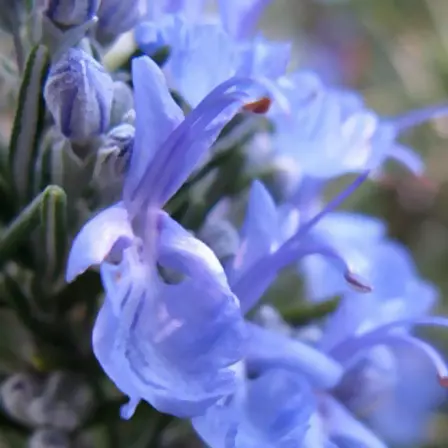
Tuscan Blue Rosemary is an erect shrub that grows 6 feet tall and spreads to 4 – 5 feet. Its bright lavender flowers bloom with stunning petals, along the fine, olive green foliage from winter to spring. The plant bears broad, fragrant leaves which are great for potpourri. Its lemony tang goes quite well with its pine smell. It responds well to clipping, making it easy to shape. Tuscan Blue looks great in a decorative pot, cottage garden and baskets.
9. Rosemary Mrs. Howard’s:
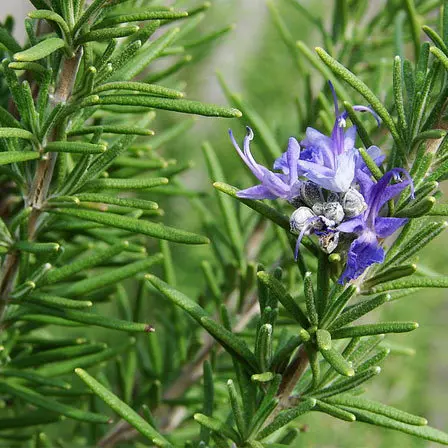
Mrs. Howard’s Rosemary is a tender, charming, and graceful perennial which grows mainly in colder regions. It has large, wide, medium green leaves on thick trailing stem. Its taller stature separates this variety from other trailing rosemary plants. It produces light blue blossoms several times during the year. It gives off a fresh, spicy scent which makes it great for cooking. Grow Mrs. Howard’s in full sun and do not overwater it.
10. Rosemary Gorizia:
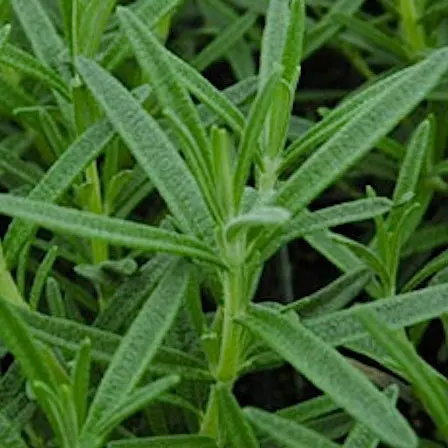
Gorizia Rosemary is named after the town Gorizia in Italy, where it was discovered. The large, broad leaves of this unique rosemary extend from thick uprightly stems blushed with reddish brown markings. Gorizia sports large, light lavender-blue flowers along the un-pruned stems. Its aroma is quite gentle, sweet and gingery. It is good to plant in a container and beddings.
11. Rosmarinus Officinalis Miss Jessopp Upright:
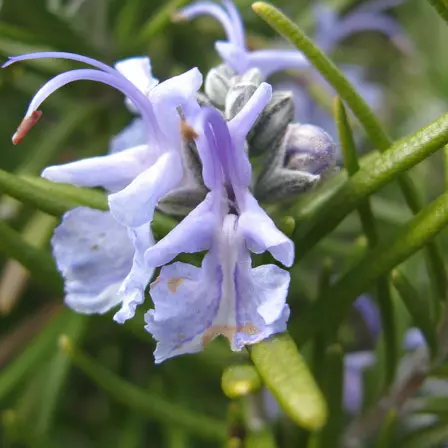
Miss Jessopp’s Upright is a compact, erect, medium sized evergreen shrub that comes with aromatic narrow, oblong leaves with silver underside. The plant bears two lipped light, blue flowers in summers which are highly fragrant. This rosemary was introduced by E.A Bowles in England and is named after Euphemia Jessopp. Its leaves are useful for flavoring roasted vegetables and meats.
12. Rosmarinus Officinalis Severn Sea:
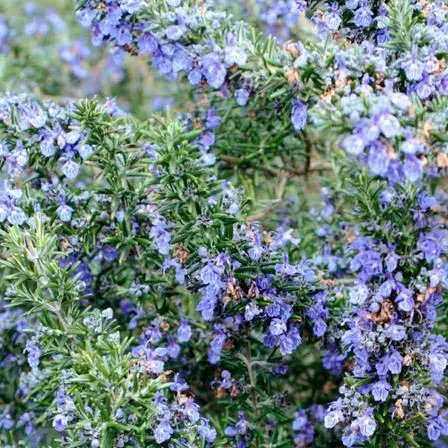
This variety was raised by Orman Hadden at West Porlock, England. Severn Sea is a woody, perennial herb with fragrant, needle-like leaves. The shrub produces bright blue, two lipped flowers in axillary clusters, creating a stunning display. The medium gray, polished leaves are borne on the strong stems for a nice and bushy appearance. The plant is most suitable for container planting or can be placed in a hanging basket for a beautiful display. It is a draught tolerant, rabbit and deer resistant rosemary.
13. Rosmarinus Officinalis Collingwood Ingram:
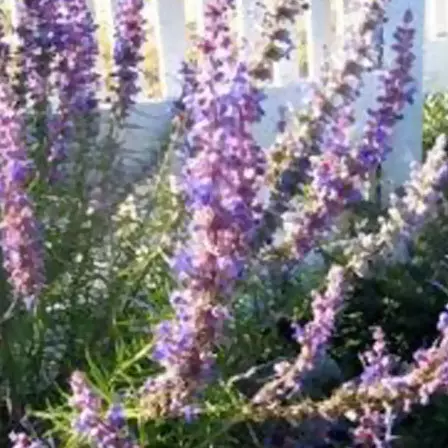
Collingwood Ingram is a semi trailing rosemary with broad rich leaves that smell of camphor. The deep green glossy leaves contrast in a gorgeous manner with its thick light, colored stems. It produces loads of blue flowers early in the season. It is very aromatic and requires full sun and well-drained soil to bloom properly. This annual flower should only be grown in full sunlight. Collingwood Ingram’s relatively fine texture sets it apart from other garden plants.
 Fun Fact
Fun Fact14. Rosemary Golden Rain:
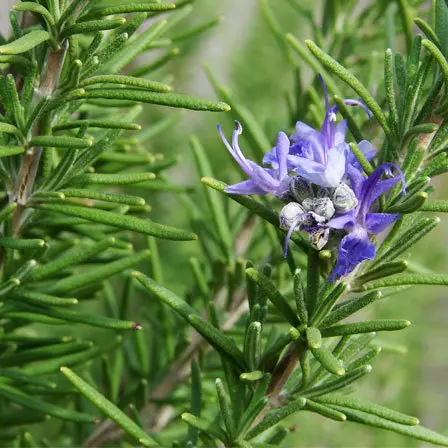
Golden rain is a unique rosemary flower with bright yellow foliage and medium sized pointed leaves with green centers. The leaves turn dark in colour as they age. The shrub produces scattered blue flowers as they mature. It is a bushy and compact plant which requires little pruning. The leaves of this variety are more refined than other varieties of rosemary. The plant radiates a golden aura which dazzles the eye.
15. Rosemary Hill Hardy:
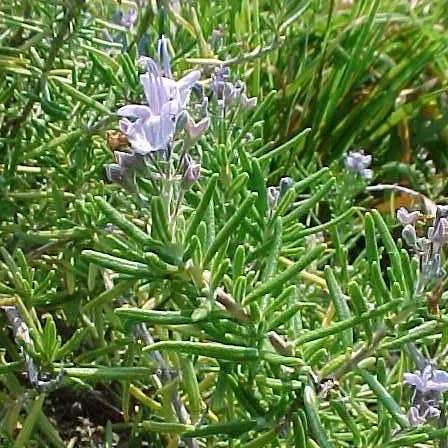
Hill Hardy is wonderful, cold tolerant rosemary. Its stiff and dark foliage is held on semi upright stems. It produces spiky leaves which adorn delicate small white flowers. The foliage has a soft yet assertive aroma. It is one of the hardiest varieties of rosemary.
16. Rosemary Mrs. Reed’s Dark Blue:
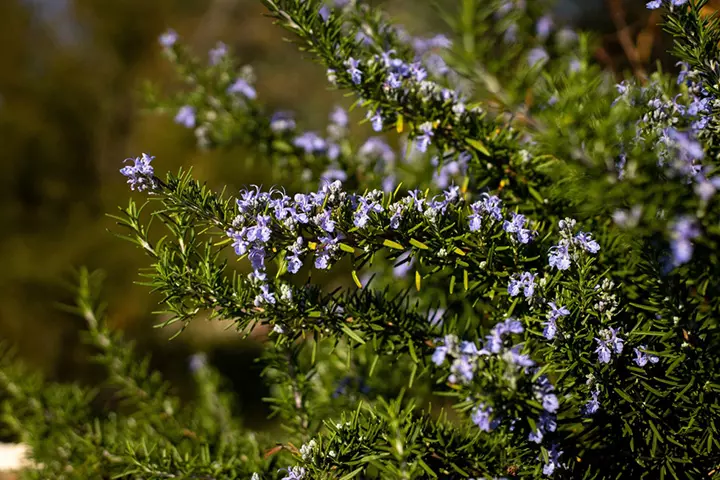
Mrs. Dark has a bushy growth habit and a dark green foliage which makes this variety look more attractive than most of the rosemary plants. Deep, dark blue flowers adorn the light green stems. It is one of the most beautiful rosemary plants.
17. Rosemary Pink-flowered Majorca:
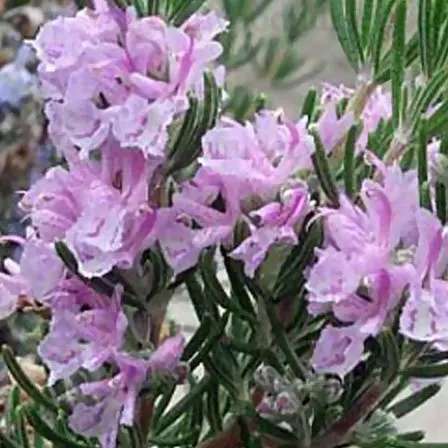
Rosemary Majorca Pink is a tall, upright rosemary flower with elegant lavender pink blooms. It produces long branches that twist around the plants and then cascade. The plant has thick stems along which dull green leaves are loosely placed. It is a delightful counter to the traditional blue rosemary. The leaves have a slightly fruity fragrance. Majorca is quite a fragile variety of rosemary and requires protection from frost.
18. Rosmarinus Officinalis Albiflorus:
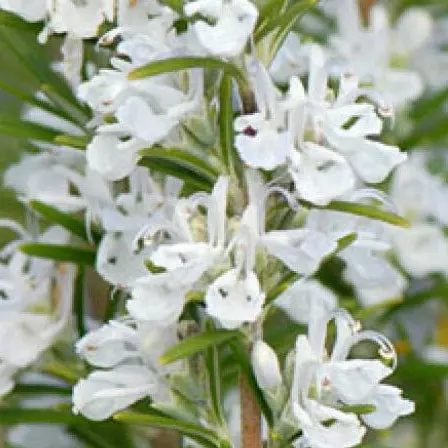
Albiflorus is a popular variety of rosemary which makes a grand statement in landscaping. The shrub produces small, white flowers amidst narrow, dark green, leathery leaves. It is a low maintenance plant and is a great choice for beginners. Like all rosemary plants, it blooms from mid-winter to late spring.
19. Rosmarinus Officinalis Nancy Howard:
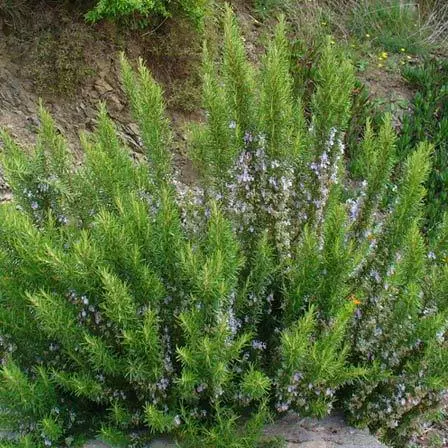
Nancy Howard is a pretty and fragrant rosemary plant which is distinguished by its white flowers which age to pink. The large deep green leaves contrast quite nicely with its stiff, white stem. Nancy Howard is an excellent rosemary flower for topiary. It is also adaptable to the seaside as it can easily withstand high wind and salt spray.
20. Rosmarinus Officinalis Gold Dust:
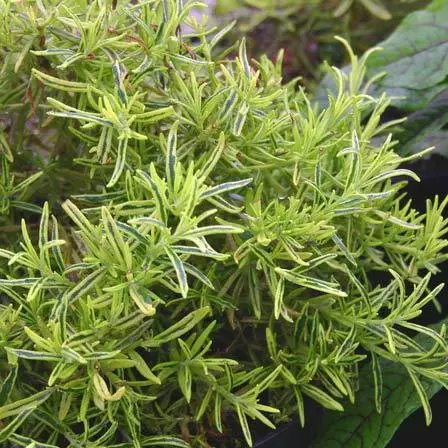
Gold Dust is an evergreen, well branched shrub with aromatic 1 inch long, narrow, dark green leaves with golden edges. This unique rosemary was discovered by Stephen and Julie of Chilliwack, British Columbia, Canada. It blooms in summer with deep blue coloured flowers and strongly scented foliage. It performs best in loamy soil and partial shade.
21. Rosmarinus Officinalis Athens Blue Spires:
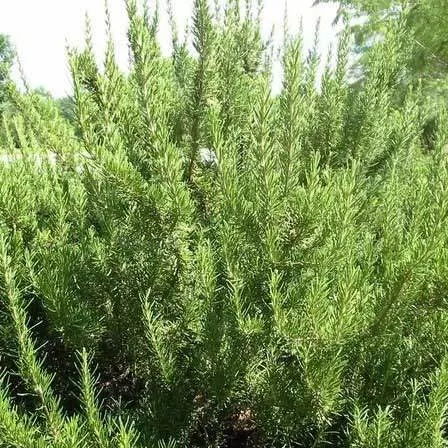
This vigorous, cold hardy rosemary boasts of lovely, lavender blue flowers on a dense, upright habit. It was introduced by Allan M. Armitage of Athens, Georgia in 1999. Blue Spires has unique grey-green, needle like foliage. The flower is a disease, heat, cold and drought resistant plant and thrives best in poor soil if well drained.
22. Rosmarinus Officinalis Benenden Blue:
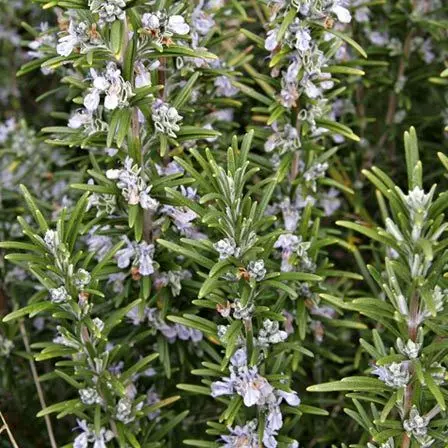
Benenden Blue is a small rosemary cultivar cascading with narrow, attractive, glossy green foliage. Benenden Blue grows up to 30 cm tall and produces small, sky blue flowers in abundance during spring, creating a beautiful display. Its leaves are narrow, linear, dark green and leathery and are highly aromatic. Benenden Blue is native to Mediterranean region and prefers light, sandy soil and sunny weather conditions. This rosemary is ideal for container planting.
23. Rosmarinus Officinalis Blue Boy:
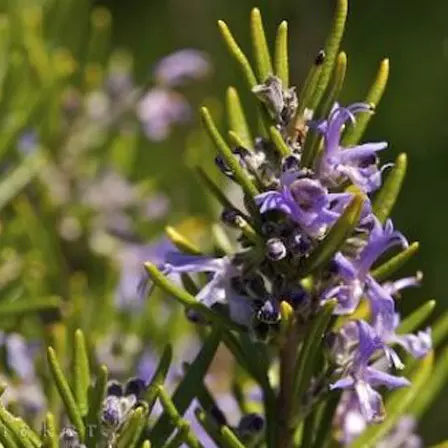
Blue Boy is a compact rosemary plant which grows just 12 inches tall. It is a dense, aromatic, upright shrub which bears pastel blue flowers and tiny evergreen leaves in springtime. This evergreen plant is drought and heat tolerant. Blue Boy is a slow growing plant and is well suited for small rock gardens and container plantings.
24. Rosmarinus Officinalis Haifa:
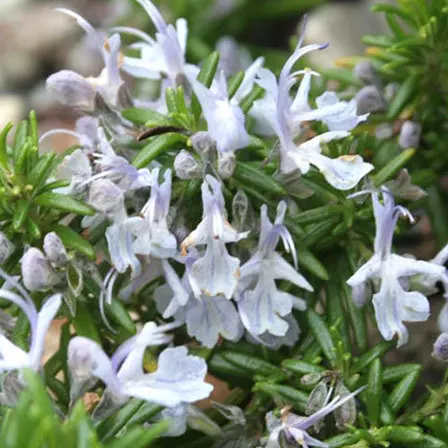
Haifa is a an extremely hardy rosemary which produces pale blue flowers across its trailing branches of dark green, needle like foliage. It is native to Europe and North Africa. It is widely used as a culinary herb and works well in borders, containers and gravel gardens.
25. Rosmarinus Officinalis Joyce DeBaggio:
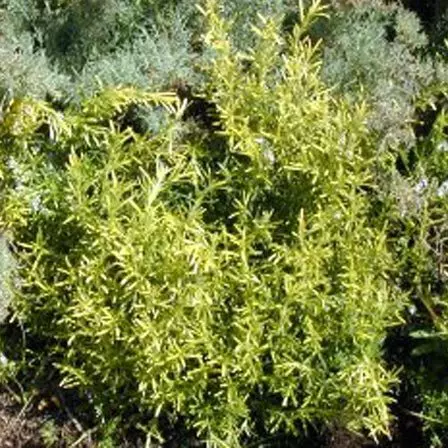
Joyce DeBaggio is a striking rosemary flower with yellow streaking that is most prominent in cool weather. The plant turns completely yellow as it ages. It was founded by Tom DeBaggio in 1940 and is named after his wife Joyce DeBaggio. The purple blue flowers are scattered all over the plant. The leaves have an interesting resinous scent. Regular pruning of this plant will keep it in a good shape. Joyce DeBaggio will make an excellent ornamental plant. These 25 rosemary flowers are sure to hold your interest. So do tell us through the comment section if you’ve planted any of these, and also share any special tips for caring.
26. Ground Cover Rosemary
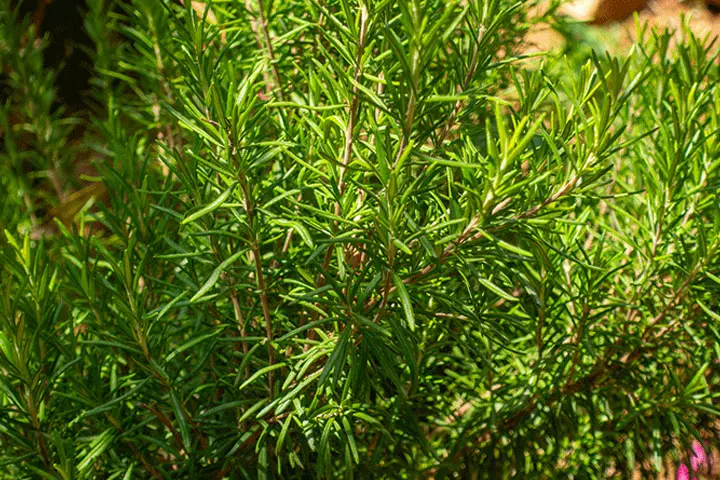
Ground cover rosemary is a charming and versatile herbaceous perennial highly valued for its aromatic, needle-like leaf. This low-growing type of rosemary produces beautiful blue blooms in the spring and occasionally all year long while forming a dense mat of evergreen leaves. Perfectly suited for edging garden beds, or serving as a fragrant ground cover, this type of rosemary adds visual interest. It adds a pleasing aroma when crushed or brushed against, making any garden area more appealing to the eye. This drought-resistant ground cover rosemary offers both ornamental beauty and culinary utility. In addition, it grows best in full sun and well-drained soil.
While these herbs and their flowers are perfect choices to grow in your garden, it is important to know what these plants need to ensure a healthy harvest. Read on to learn more.
How To Grow And Care For Rosemary
Rosemary is a hardy herb that’s easy to grow and care for. This makes it an excellent addition to your garden or kitchen herb collection. By following a few simple care tips, you can grow a thriving rosemary plant. So ensure your rosemary flourishes, here are a few essential care tips:
- Well-Drained Soil: Rosemary prefers soil that drains well, so ensure the pot or garden bed has good drainage to prevent waterlogging.
- Full Sunlight: Plant rosemary in an area where it will receive at least 6-8 hours of direct sunlight daily, as it thrives in bright, sunny conditions.
- Water Sparingly: Once the topsoil is dry, water the plant lightly. Make sure the soil is well-drained.
- Regular Pruning: Trim the plant regularly to encourage healthy growth and prevent it from becoming woody. Pruning also stimulates flower production, adding to its beauty and fragrance.
Once you know how to grow and care for a rosemary plant, you can also learn how to use it when cooking. Discover how to use rosemary in the culinary world in the next section.
Culinary Uses Of Rosemary

Rosemary pairs well with meats, potatoes, and bread, and can also be infused in oils and vinegar. You can use it to garnish dishes or in a salad dressing. You can roast some rosemary in oil and then cook veggies or meat to give it a refreshing taste. You can add it to spice mixes for soups and stews. You can also crush rosemary and add it in cakes and other desserts to give them a little spicy and refreshing flavor. You can also blend rosemary with fruits and other ingredients to make teas or cooling drinks. Rosemary’s pine-like fragrance and slightly peppery taste make it a favorite in Mediterranean and rustic cuisines. Here are some recipes to try.
1. Rosemary Garlic Roasted Chicken
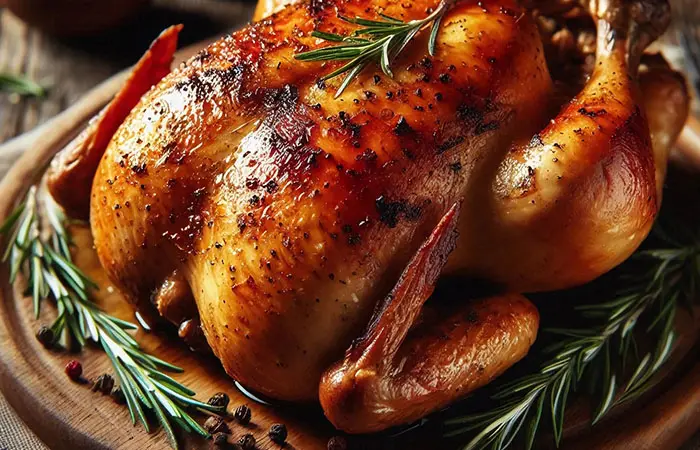
Ingredients
- 1 whole chicken
- 2 teaspoons salt
- 1 teaspoon black pepper
- 4 cloves garlic
- 2 tablespoons freshly chopped rosemary
- 1 lemon, cut into wedges
- 4 whole garlic cloves
- 3 sprigs fresh rosemary
- 3 tablespoons olive oil
- 2–3 potatoes
- 2–3 carrots
Directions
- Preheat your oven to 375°F, and rinse the chicken and pat it dry.
- Rub salt, pepper, minced garlic, and chopped rosemary all over the chicken, both inside and out.
- Fill the cavity with lemon wedges, whole garlic cloves, and fresh rosemary sprigs.
- Rub the chicken with olive oil to ensure crispy, golden skin.
- Place the chicken in a roasting pan. Surround it with quartered potatoes and carrots, tossing them with olive oil, salt, pepper, and a sprinkle of rosemary.
- Roast in the preheated oven for 2 hours, basting the chicken occasionally with its juices.
- Check for doneness using a meat thermometer; the internal temperature should reach 165°F at the thickest part of the chicken (avoiding the bone).
- Let it rest for 10 minutes and serve it alongside the roasted vegetables for a complete meal.
- Enjoy this classic, savory dish with rosemary and garlic’s delightful aroma and flavor!
2. Rosemary Infused Olive Oil
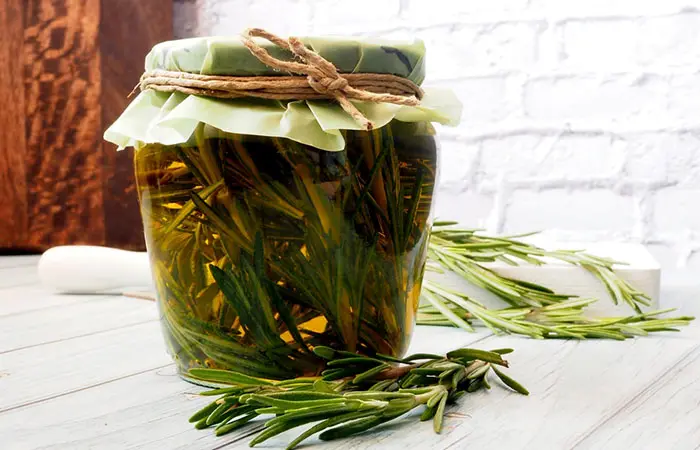
It is a simple yet flavorful oil infusion that adds yumminess and flavor to salads, pasta dishes, or even as a dipping oil for bread.
Ingredients
- 1 cup olive oil
- 4 fresh rosemary sprigs
- A glass bottle or jar
Directions
- Wash the rosemary sprigs under cold water and pat them dry completely to prevent moisture in the oil.
- In a small saucepan, heat the olive oil over low heat until warm but not boiling (about 150°F).
- Add the rosemary sprigs to the warm oil and let the rosemary steep in the oil for 10 minutes, stirring gently to release its flavor.
Let the oil cool completely. - For a stronger infusion, leave the rosemary in the oil. Alternatively, strain the oil to remove the sprigs for a milder flavor.
- Pour the infused oil and seal tightly and store in a cool, dark place.
- Use this aromatic rosemary-infused olive oil for drizzling over salads, dipping bread, or enhancing your favorite dishes!
Elevate everyday dishes with a fragrant twist by incorporating rosemary into your meals! Whether enjoyed as a tea, infused with oil, or used in cooking, rosemary can be a powerful addition to your wellness routine.
Infographic: 8 Gorgeous Rosemary Flower Varieties
Rosemary is a famous plant. We all are familiar with its culinary, aromatic, and esthetic importance. But did you know that this sweet-smelling and gorgeous-looking plant is available in over 100 varieties? In the infographic below, we list 8 of those varieties that are popular globally. Take a look.

Illustration: StyleCraze Design Team
Rosemary flowers come in many different shades of blue, white, and pink, depending on the variety. It has a rich, resinous flavor, and the aroma is unique. This is a lovely plant to have in the gardens because it comes in a variety of shapes and sizes and is adaptable and easy to grow. However, these landscaping plants are more than just attractive. You will be rewarded with rich fragrances, flavors, and colors, no matter which rosemary variety you choose.
Illustration: Most Beautiful Rosemary Flowers
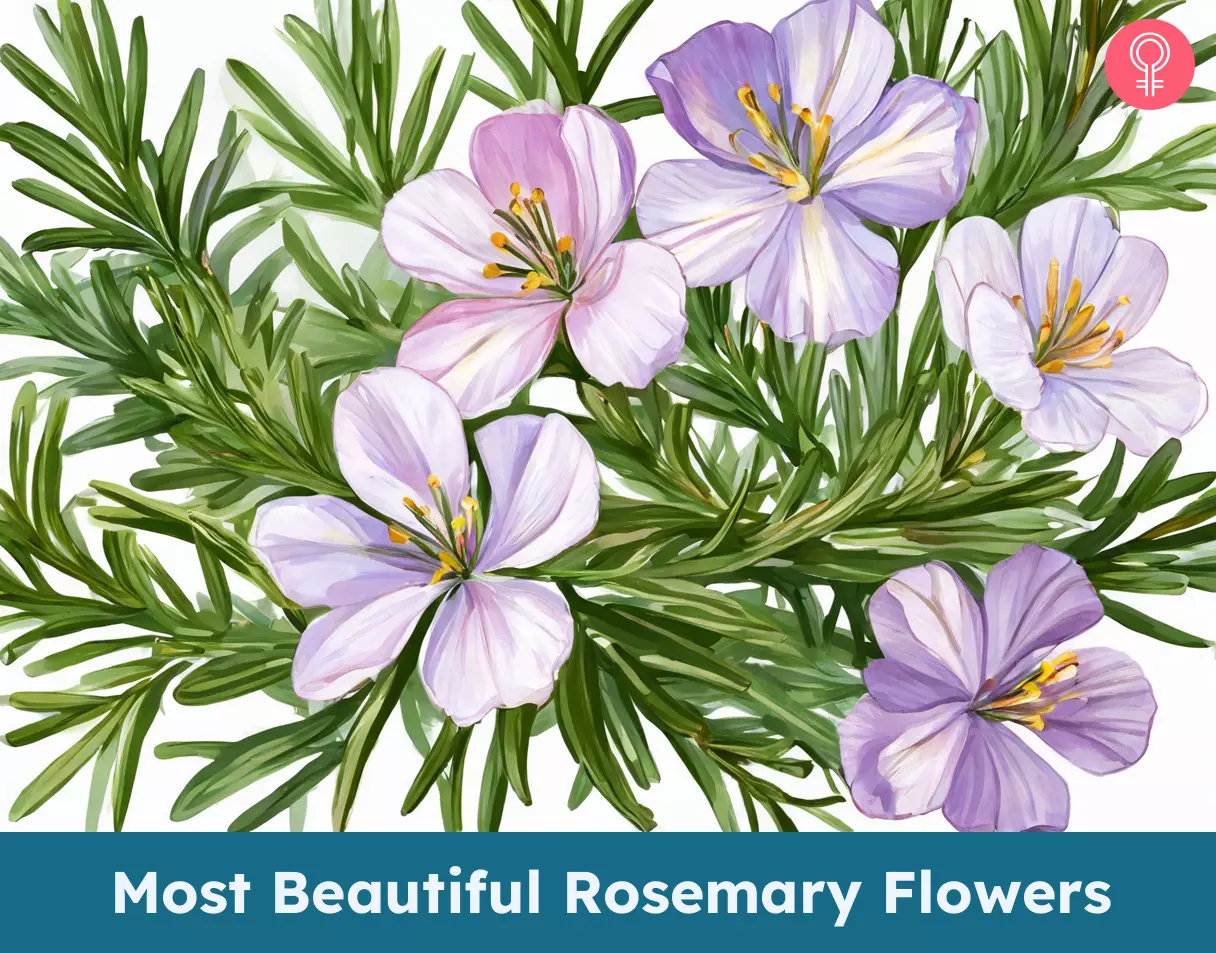
Image: Stable Diffusion/StyleCraze Design Team
Frequently Asked Questions
What is golden rosemary?
Golden rosemary is an evergreen plant. It has bright yellow foliage in early spring and late fall. Its color gives it an attractive appearance and the leaves have a unique aroma.
How do you grow pink rosemary?
Pink rosemary can be grown well in full sun and well-drained soil. Organic compost or any other organic waste best supports its growth.
What is the closest smell to rosemary?
The closest smell to rosemary is that of pine or eucalyptus. Other herbs like thyme, sage, and mint may also have a similar smell due to the presence of the same aromatic compounds in their composition.
How do I care for rosemary plants to encourage the growth of flowers?
Rosemary plants need proper care and attention to grow healthy and produce beautiful flowers. Give the plants plenty of direct sunlight, water them properly once a week, allow the soil to dry out slightly between waterings, prune the plants regularly, use an all-purpose or natural fertilizer, and offer them good air circulation to encourage the growth of flowers on the rosemary plants.
What is the significance of rosemary flowers in traditional medicine or folklore?
Rosemary flowers have a rich and long history in traditional medicine and folklore. In ancient Greece, students wore rosemary flower garlands around their necks while studying for exams to improve their memory. These flowers were believed to have spiritual properties and were often used in ancient times to ward off evil spirits and treat various ailments. In Ayurvedic medicine, using rosemary was said to relieve joint pain and inflammation. It was also used to treat asthma and relieve coughs and colds in alternative Chinese medicine.
Step into the enchanting world of rosemary flowers, where delicate petals dance in the sunlight, releasing their captivating aroma and adding to nature’s timeless beauty, with this video.
Read full bio of Ramya Karamsetti
Read full bio of Subhrojyoti Mukherjee



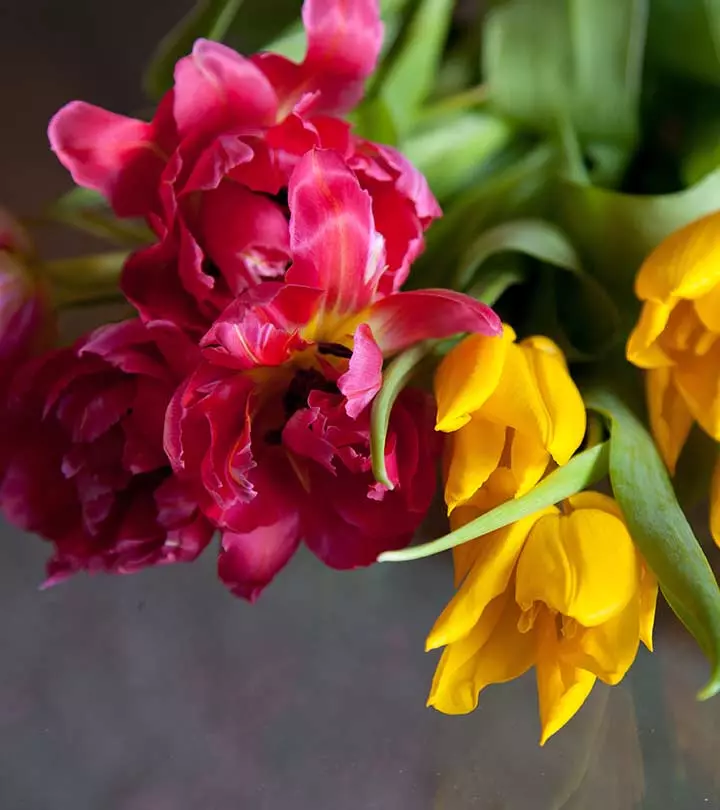
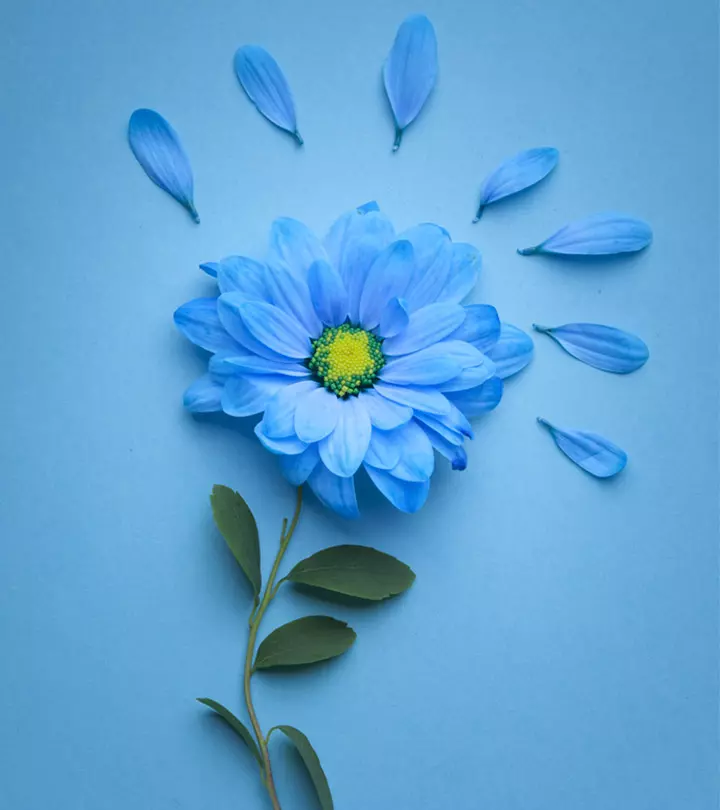
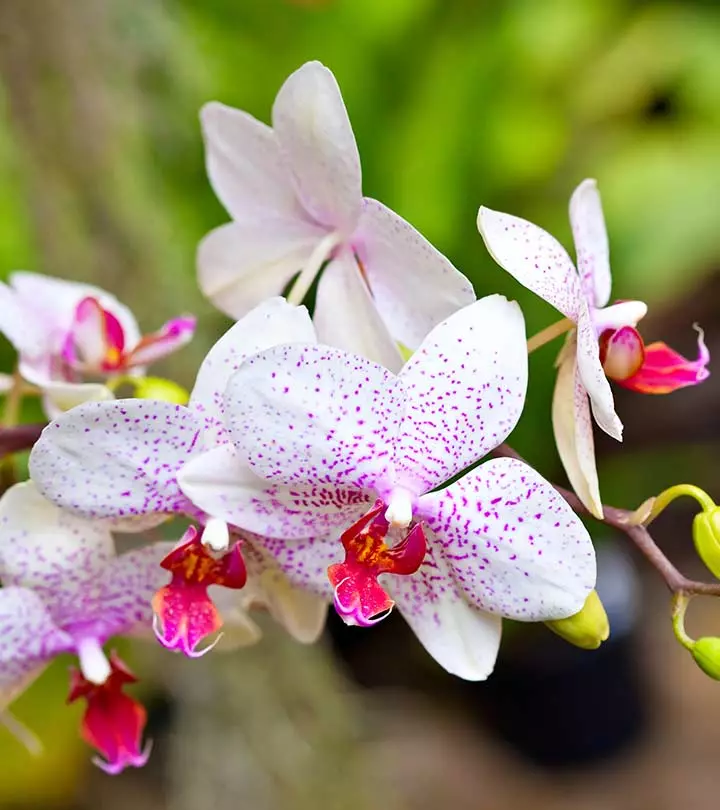
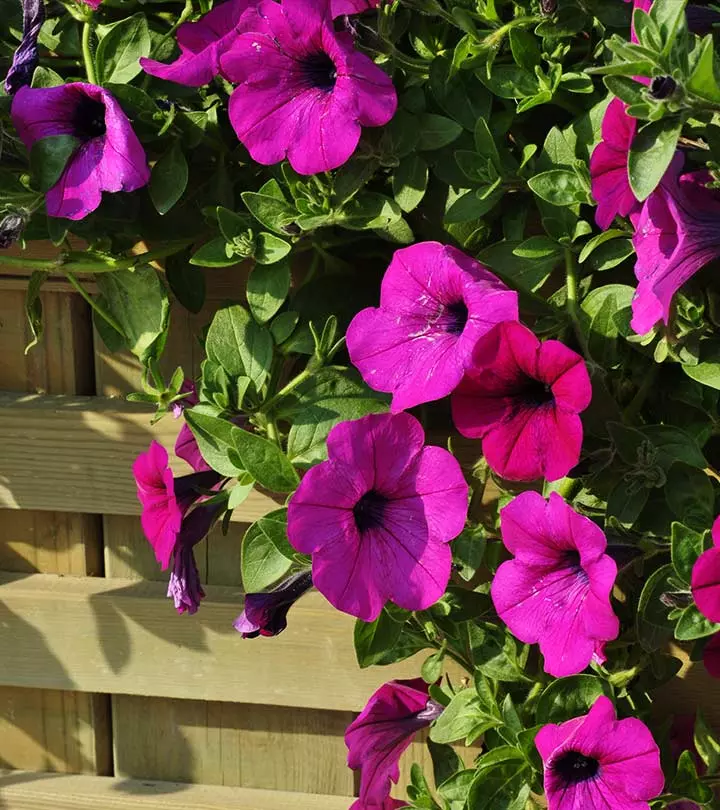
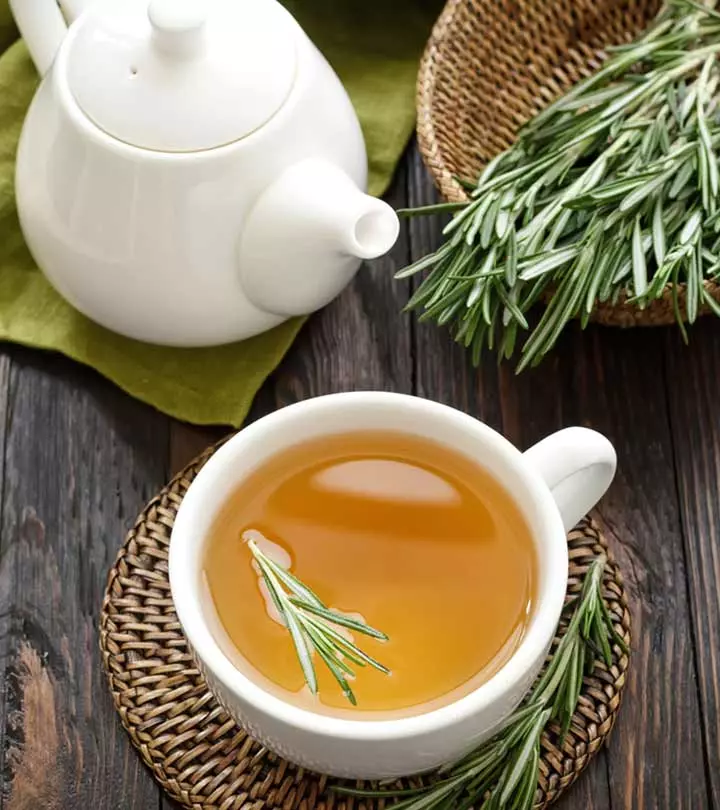

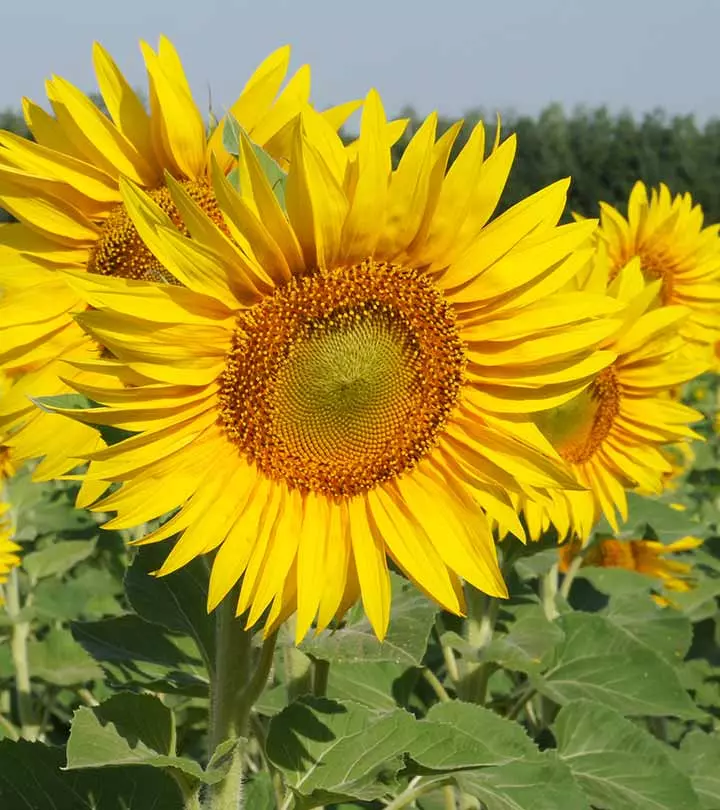
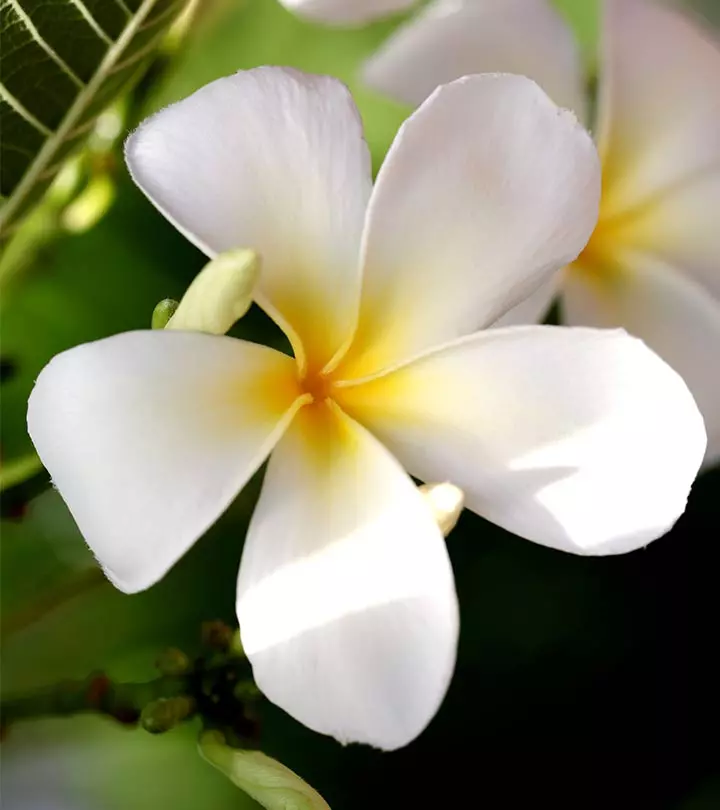
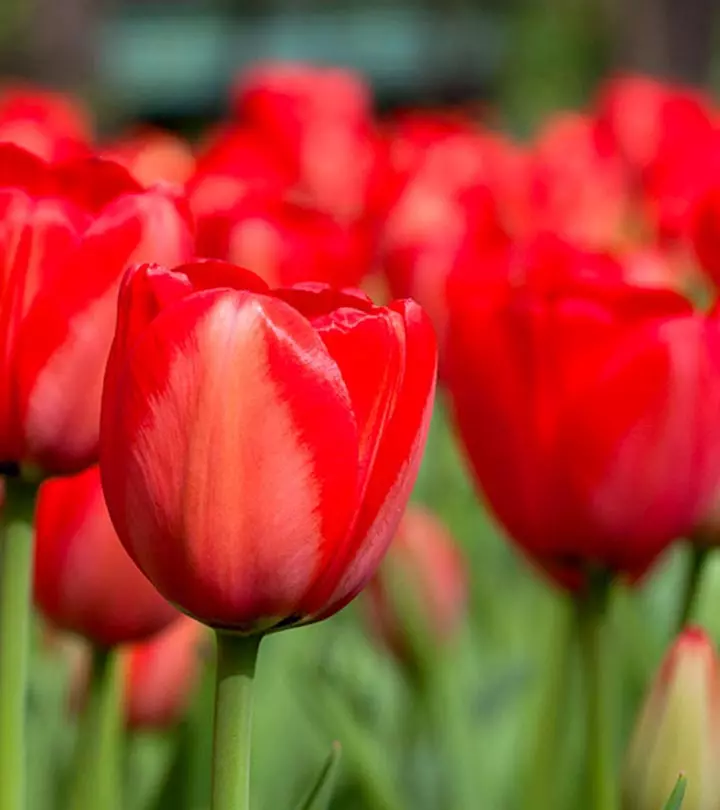
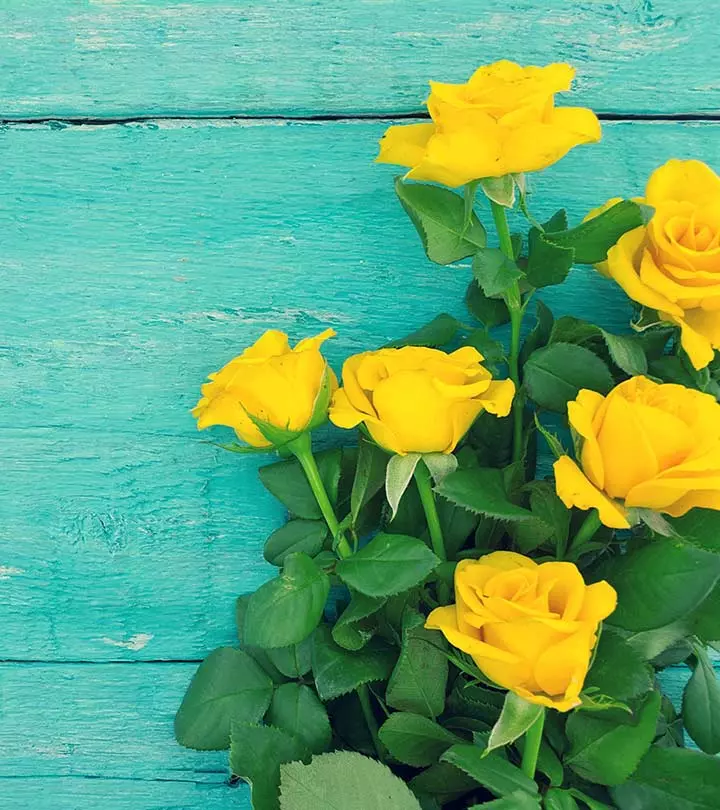

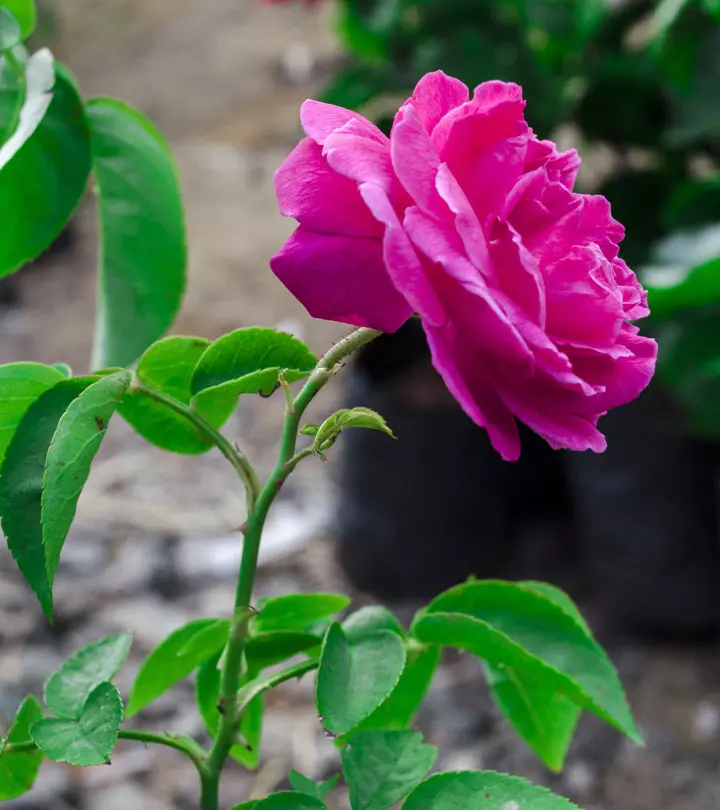
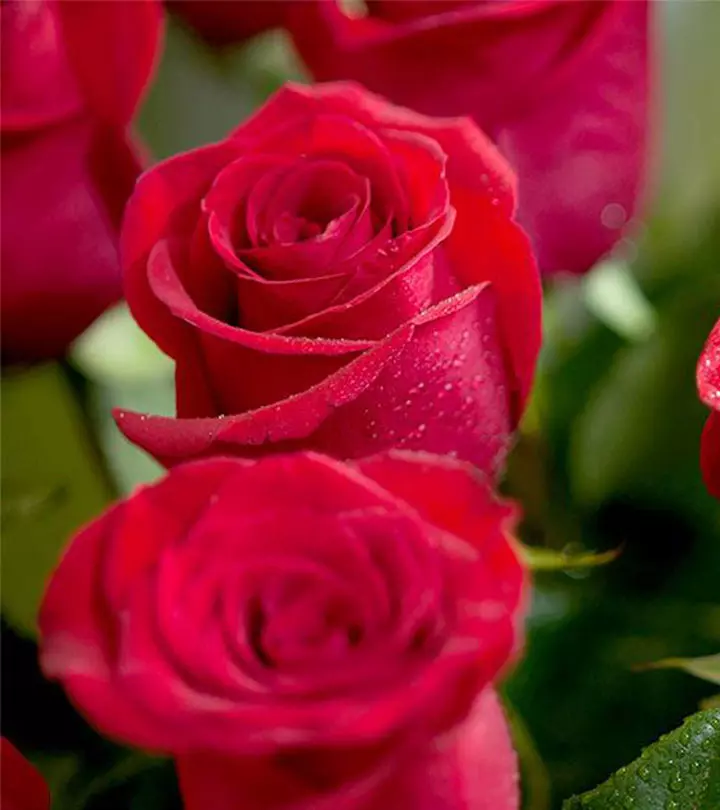
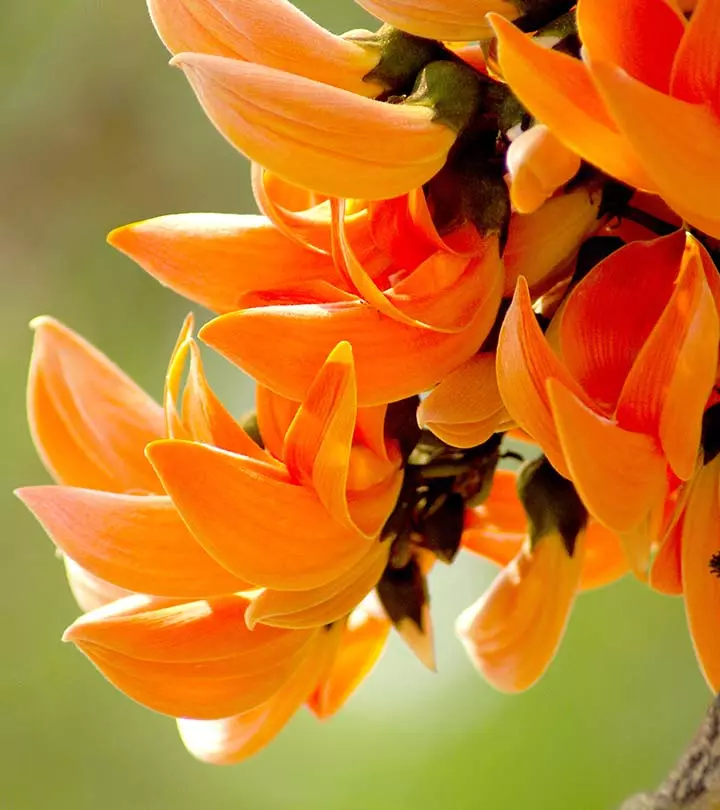
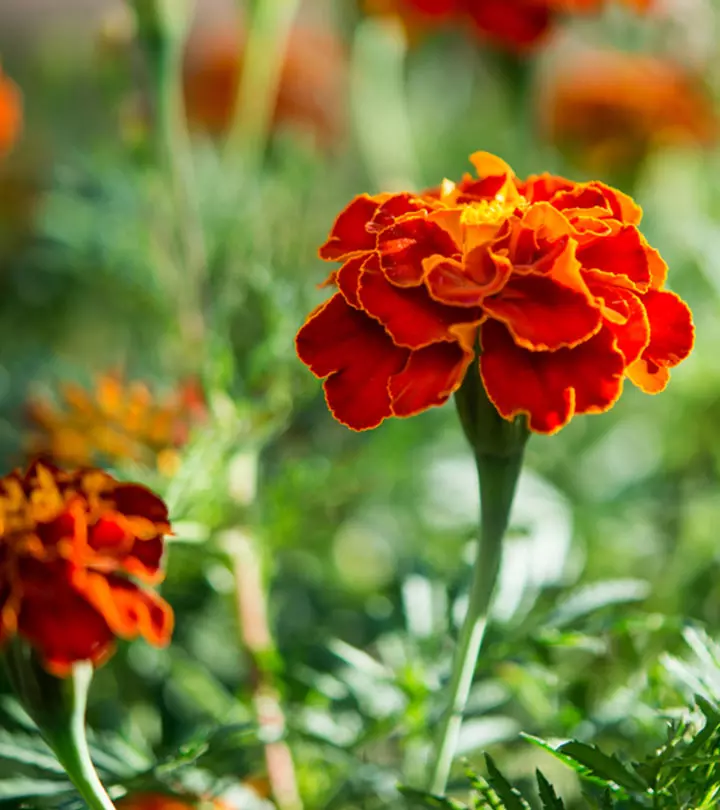
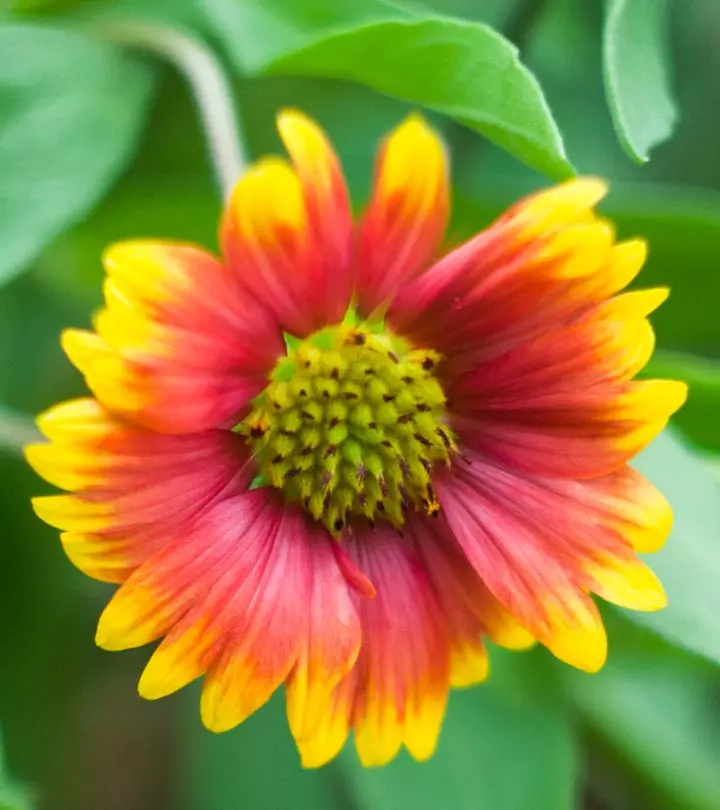
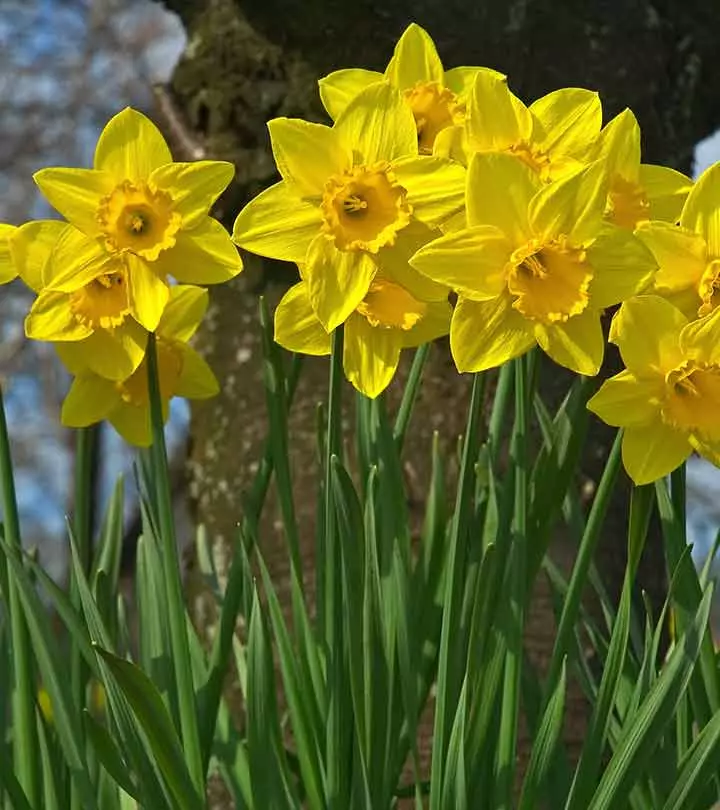
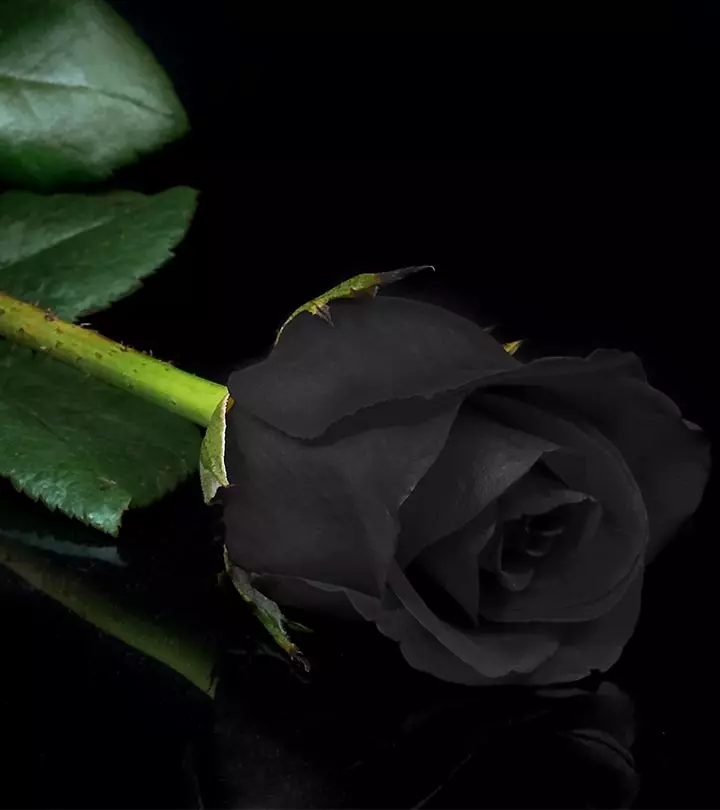
Community Experiences
Join the conversation and become a part of our empowering community! Share your stories, experiences, and insights to connect with other beauty, lifestyle, and health enthusiasts.